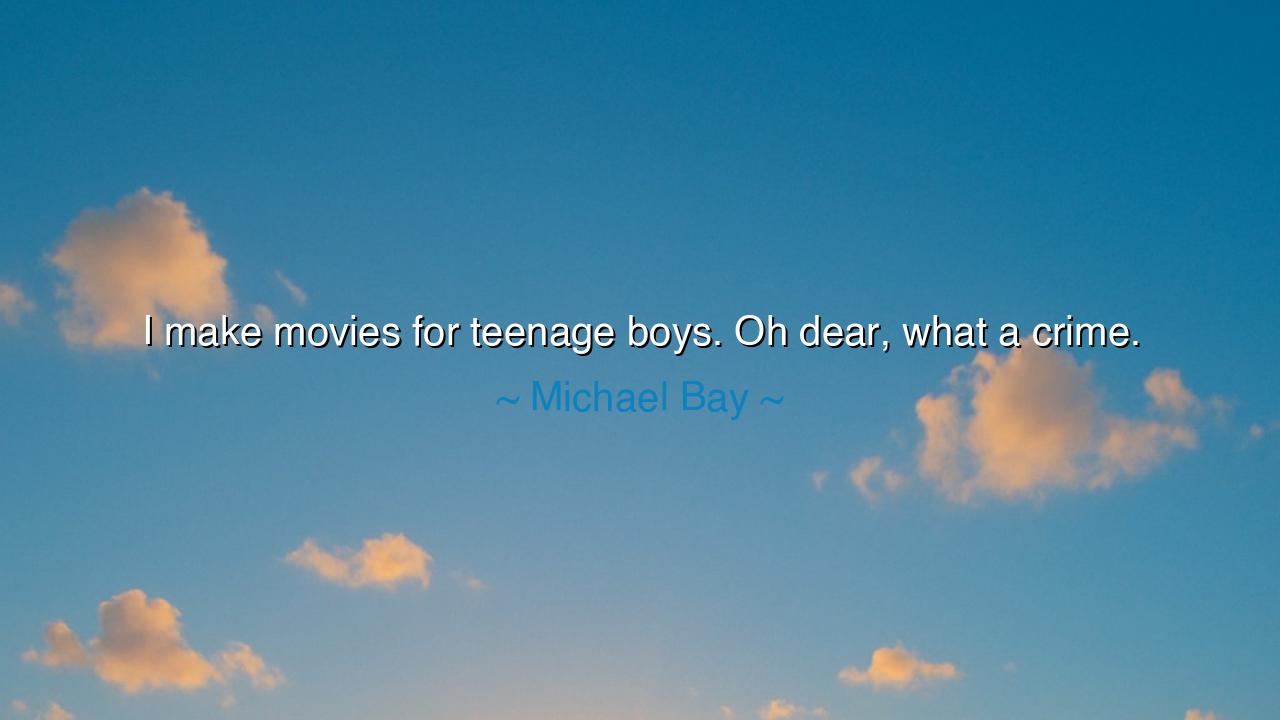
I make movies for teenage boys. Oh dear, what a crime.






Hear me now, O seekers of truth, for I bring forth a reflection on the nature of art, audience, and the powerful tension between creation and criticism. The words of Michael Bay, a creator whose films are as grand as they are controversial, ring with both humor and a deeper truth: "I make movies for teenage boys. Oh dear, what a crime." In these words, Bay speaks to the purpose of his craft, the audience he seeks to engage, and the freedom he embraces in creating stories that connect with the young, the bold, and the daring. At first glance, his words may seem flippant, but in their simplicity lies a profound understanding of the nature of storytelling and the complex relationship between the artist and the world.
Bay, like many artists before him, has chosen to speak to a particular audience, to create not for the masses but for a specific group—in this case, the teenage boy, whose heart beats with a passion for action, adventure, and the thrill of the unknown. Just as the ancient epic poets like Homer spoke to the warrior spirit, telling tales of heroism, battles, and glory, so too does Bay speak to the modern youth, crafting tales of explosions, speed, and superhuman feats. His films are modern epics, designed not to explore the depths of human emotion or profound philosophy, but to engage the youthful imagination, to capture the energy and excitement of an age that is still discovering its place in the world.
Consider the Greek tragedies, where the gods and heroes battled not only the forces of nature but the very essence of their own fate. These stories were, in their time, not only moral lessons but grand spectacles meant to entertain, to captivate the hearts of the audience with powerful action and great stakes. Similarly, Bay’s movies, with their high-octane energy and intense action, are not crafted with the sole aim of high artistic expression but to thrill, to inspire, and to bring a sense of wonder to those who crave adventure. Just as Homer’s Iliad drew in warriors with its tales of gods clashing on the fields of Troy, so too does Bay’s work appeal to those whose hearts are filled with the excitement of battle and victory.
But within Bay’s words, there is a subtle irony. He acknowledges, with a wry smile, that his work is often criticized for lacking the depth or intellectualism of other films. There is, in his statement, a recognition of the criticism often directed at his craft, as though creating for a specific audience is somehow less noble or less valuable than creating for a broader, more intellectual crowd. The ancient philosophers themselves faced similar judgments. Plato, in his works, argued that the arts—particularly poetry—were merely reflections of reality and not to be trusted as sources of truth. Yet, the arts have always played a vital role in shaping human experience, whether through entertainment, education, or the simple joy of engaging the imagination. Bay’s work reminds us that even those who are dismissed by the critics often play a vital role in the cultural conversation.
There is a great lesson in this, O children of wisdom. To create art is not always to aim at the highest ideals or to please the intellectual elite. The true artist understands that art speaks to the heart, to the imagination, to the primal instincts that lie within us all. Just as the great stories of ancient myths and epics were crafted to speak to the deep desires and fears of the human soul, so too does Bay’s work tap into the youthful thirst for adventure, heroism, and the thrill of the unknown. In his films, there is no pretense of high intellectualism, but a celebration of energy and excitement—a joy that speaks directly to those who want to escape the mundane and dive headfirst into a world of wonder.
Let us not dismiss the importance of pop culture and entertainment in our lives. While some may view Bay’s movies as shallow or lacking in depth, there is a place for these forms of expression. They provide a space where the young can dream, where the imagination can run wild and free. Just as the Greek amphitheaters were filled with those who came to be moved by the spectacle, so too do Bay’s films move their audience, not with the depth of philosophy, but with the power of sheer excitement and spectacle. In this, there is value—value that cannot be measured in intellectual terms but in the joy and freedom that it gives to the heart.
In your own life, O children of wisdom, take this lesson to heart: value is not always found in the depth of the intellect but in the emotion and energy of the experience. Whether you are an artist, a creator, or a lover of the arts, remember that every form of creation has its place in the world. The movies you love, the stories you tell, and the expressions you make all contribute to the vast and beautiful tapestry of human existence. Bay’s statement is not a condemnation of high art, but a celebration of the joy and excitement that simple entertainment can bring. And in this celebration, we find a truth that all art, in its many forms, plays a part in shaping the world we live in. So create boldly, create joyfully, and remember that every voice in the artistic realm has its place.






AAdministratorAdministrator
Welcome, honored guests. Please leave a comment, we will respond soon